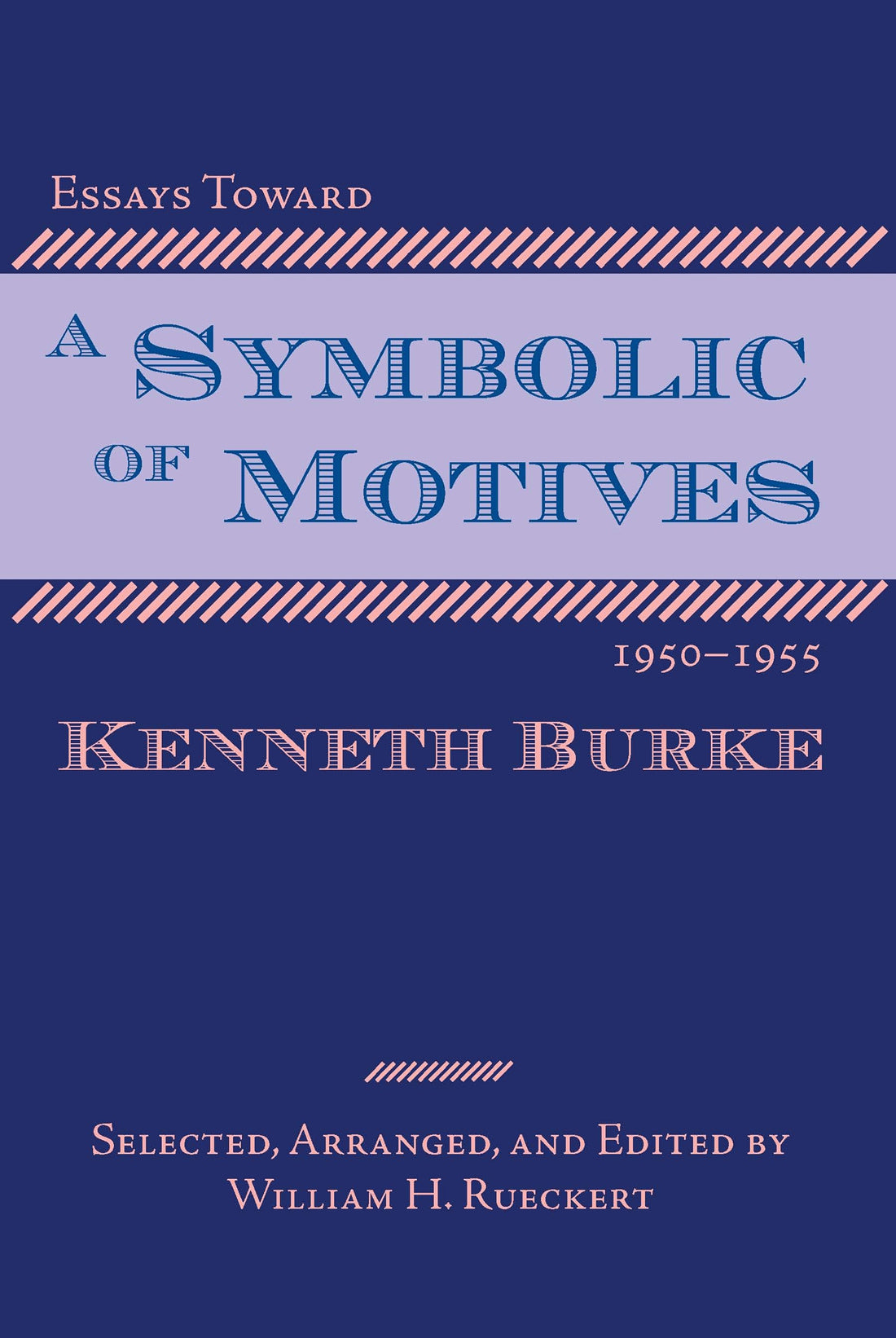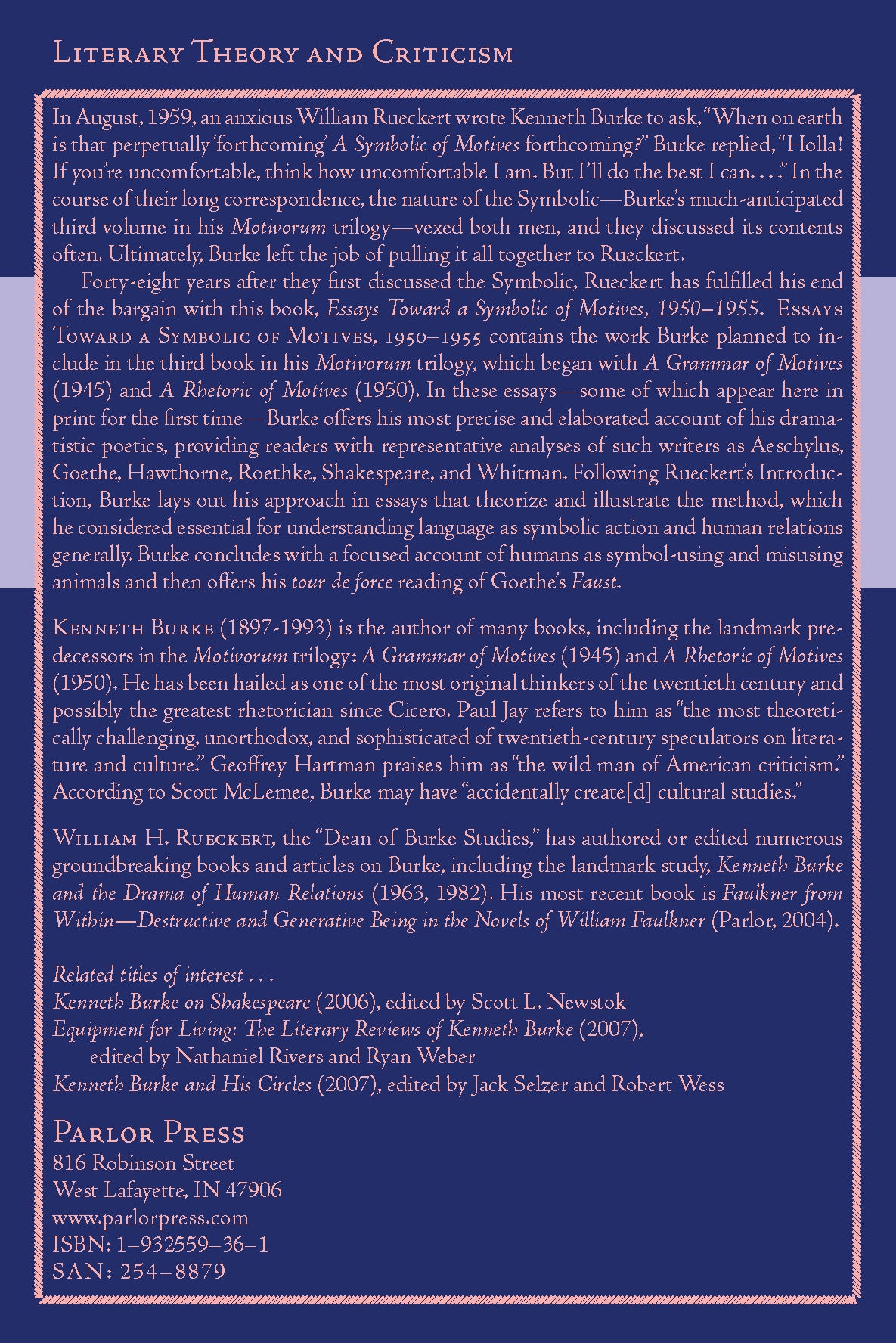Description
Kenneth Burke
Selected, Arranged, and Edited by William H. Rueckert
Information and Pricing
978-1-932559-34-7 (paperback; $32.00); 978-1-932559-35-4 (cloth; $65.00); 978-1-932559-36-1 (PDF, $18.00) © 2007 by Parlor Press. 368 pages, with introduction, bibliography, notes, and index
Bookstores: Order by fax, mail, or phone. See our "Sales and Ordering Page" for details.
Description
In August, 1959, an anxious Bill Rueckert wrote Kenneth Burke to ask, “When on earth is that perpetually “forthcoming” A Symbolic of Motives forthcoming? Will it be soon enough so that I can wait for it before I complete my book [Kenneth Burke and the Drama of Human Relations]? If the Symbolic is not forthcoming soon, would it be too much trouble for you to send me a list of exactly what will be included in the book, and some idea of the structure of the book?” Burke replied, “Holla! If you’re uncomfortable, think how uncomfortable I am. But I’ll do the best I can. . . .” In the course of their long correspondence, the nature of the Symbolic—Burke’s much-anticipated third volume in his Motivorum trilogy—vexed both men, and they discussed its contents often. Ultimately, Burke left the job of pulling it all together to Rueckert.
Forty-eight years after they first discussed the Symbolic, Rueckert has fulfilled his end of the bargain with this book, Essays Toward a Symbolic of Motives, 1950–1955. This collection contains the work Burke planned to include in the third book in his trilogy, which began with A Grammar of Motives (1945) and A Rhetoric of Motives (1950). In this book—some of which appears here in print for the first time—Burke offers his most precise and elaborated account of his dramatistic poetics, providing readers with representative analyses of such writers as Aeschylus, Goethe, Hawthorne, Roethke, Shakespeare, and Whitman. Following Rueckert’s Introduction, Burke lays out his approach in essays that theorize and illustrate the method, which he considered essential for understanding language as symbolic action and human relations generally. Burke concludes with a focused account of humans as symbol-using and misusing animals and his tour de force reading of Goethe’s Faust.
About the Author
Kenneth Burke (1897-1993) is the author of many books, including the landmark predecessors in the Motivorum trilogy: A Grammar of Motives (1945) and A Rhetoric of Motives (1950). He has been hailed as one of the most original thinkers of the twentieth century and possibly the greatest rhetorician since Cicero. Paul Jay refers to him as “the most theoretically challenging, unorthodox, and sophisticated of twentieth-century speculators on literature and culture.” Geoffrey Hartman praises him as “the wild man of American criticism.” According to Scott McLemee, Burke may have “accidentally create[d] cultural studies.”
About the Editor
William H. Rueckert, the “Dean of Burke Studies,” authored or edited numerous groundbreaking books and articles on Kenneth Burke, William Faulkner, and others. They include the landmark study, Kenneth Burke and the Drama of Human Relations (1963, 1982), Critical Responses to Kenneth Burke, 1924-1966 (1969), and Encounters with Kenneth Burke (1994). With Angelo Bonadonna, he is the editor of Burke’s On Human Nature, A Gathering While Everything Flows: Essays, 1967-1984 (2005). He is also the author of Glenway Wescott (1965), Faulkner From Within — Destructive and Generative Being in the Novels of William Faulkner (Parlor, 2004), and the editor of Letters from Kenneth Burke to William H. Rueckert, 1959-1987 (Parlor, 2003). His essays include the often-cited “Literature and Ecology: An Experiment in Ecocriticism.” Rueckert completed work on the Symbolic shortly before his death in late 2006.
Contents
Preface
Introduction, William H. Rueckert
Part 1: Some Basic Requirements for a Dramatistic Poetic
1 A “Dramatistic” View of “Imitation”
2 Three Definitions
3 The Language of Poetry, “Dramatistically” Considered
4 Fact, Inference, and Proof in the Analysis of Literary Symbolism
Part 2: Dramatistic Analyses of Individual Texts and Authors
5 Ethan Brand: A Preparatory Investigation
6 The Orestes Trilogy
7 Othello: An Essay to Illustrate a Method
8 The Vegetal Radicalism of Theodore Roethke
9 Policy Made Personal: Whitman’s Verse and Prose-Salient Traits
Part 3: By and Through Language, Beyond Language
10 A Socioanagogic Approach to Literature: Selections from “Linguistic Approach to Problems of Education”
11 Goethe’s Faust, Part I
Index


